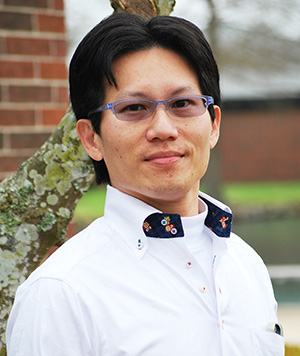LU researcher published in research journal Nature
 Lamar University assistant professor of biology, Ian Lian, is part of an international research team that recently had a study published in the February issue of Nature, widely accepted as the leading research journal in the world. The results of the five-year research project suggest promising advances in treating patients who suffer from certain types of cancer and various inflammatory bowel diseases.
Lamar University assistant professor of biology, Ian Lian, is part of an international research team that recently had a study published in the February issue of Nature, widely accepted as the leading research journal in the world. The results of the five-year research project suggest promising advances in treating patients who suffer from certain types of cancer and various inflammatory bowel diseases.
“This research study will put Lamar University on the map with regard to participation in the top tier of international research,” Lian said. “The lead researcher on the team, Dr. Michael Karin, is the most cited researcher in the world for this type of research.”
All injuries, even the smallest cut and scratch, trigger an inflammatory response that is part of the body’s natural healing mechanism. Inflammation works to heal the body by protecting against microbes and by stimulating regenerative signals needed for healing and injury repair. This inflammatory response is generally understood, however, some aspects of that process remain a mystery to researchers. The research team has discovered new links between the inflammatory response and regeneration.
Current medical practice dictates administering drugs to reduce inflammation that actually work against the body’s natural disease fighting mechanisms. This research sought to discover pathways to stimulate regenerative signals for natural healing mechanisms without the use of commonly prescribed destructive drugs that tend to damage cells and tissue. As a result of this research, it may be possible to develop a new class of drugs with these properties that could be more effective for patients who suffer from Crohn’s disease, ulcerative colitis, irritable bowel disorder and colorectal cancer.
The team has been working with laboratory mice during the first phase of the research because the genetic makeup of mice, with regard to enzymes, inflammatory response and regulatory systems, are very similar to humans. The focus of the cell research was centered on the digestive tract of mice because those particular cells grow very fast. That, coupled with the fact the metabolic rates for mice is much faster than humans, is advantageous for accelerating the research process. The discoveries made in digestive tract cell research could have major implications for other cells in the body, including cancer cells.
“The research establishes some very good results in animals. Further research will include a similar study with a larger species of animal before it is eligible for clinical trials in humans,” Lian said. “We hope to discover mechanisms the body can take advantage of to heal itself more efficiently. These pathways are very important for stem cells to maintain their potency in the healing process. ”
Lian joined the Lamar faculty in 2013 and has conducted related research at the University of California San Diego. He has published papers on the links between inflammation and epithelial regeneration, as well as, novel signaling pathway for stem cell self-renewal.


